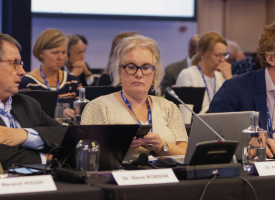AMA SA seeks total ban on TV gambling advertising
The President of the Australian Medical Association in South Australia AMA SA, Dr John Williams, has joined experts in gambling addiction at Flinders University in writing to all members of the Australian and South Australian parliaments asking for strong national action to ban gambling advertisements.

The President of the Australian Medical Association in South Australia (AMA(SA)), Dr John Williams, has joined experts in gambling addiction at Flinders University in writing to all members of the Australian and South Australian parliaments asking for strong national action to ban gambling advertisements.
Dr Williams said a joint letter from AMA(SA) and members Professor Michael Baigent and Professor Malcolm Battersby from Flinders University, who as psychiatrists and researchers established the Statewide Gambling Therapy Service in South Australia in 1997, was sent on 29 August.
It asks the federal and state politicians to use their positions of power to personally lobby the Prime Minister and other Federal Government decision-makers and impose a total ban on gambling advertising on television, rather than the ‘partial ban’ being discussed in recent media reports.
‘AMA(SA) is extremely disappointed by media reports suggesting that the Albanese government is considering implementing a partial ban on gambling ads, with caveats for various platforms and at certain times,’ Dr Williams said.
‘We’re seeking help from the Premier and South Australian MPs to ensure the Prime Minister prioritises the health and wellbeing of the public above the profits of major sporting and media businesses in this country.’
Prof Baigent and Prof Battersby wrote a similar letter to the Prime Minister earlier this month. They warn that gambling advertising can directly trigger gambling behaviour, especially among adolescents.
‘The House of Representatives’ inquiry into on-line gambling, “You win some, you lose more”, concluded what we had feared: gambling advertising and simulated gambling through video games, is grooming children and young people to gamble,’ Prof Baigent said.
‘We know that children and adolescents, particularly males, have not yet fully developed executive cognitive functions and are vulnerable to gambling advertising messages that suggest winning is easy, winning is frequent and gambling is a quick way to get rich.’
A 2023 Australian Institute of Family Studies report highlighted that exposure to gambling advertising had the greatest impact on people aged 18 to 34 years and people at risk of gambling harm.
One in five young women (19%) and one in seven young men (15%) bet for the first time after seeing or hearing an ad on TV.
Among adolescents who were at risk of gambling harm, 40% bet on impulse in response to seeing or hearing betting advertisements.
‘Every day in our clinic and our in-patient service we see the devastating effects of gambling, not only on the gambler but also their families, friends and colleagues,’ Prof Battersby said.
‘Sadly, people only seek help in a crisis, as a last resort because of shame and stigma. By then, lives may be destroyed with loss of relationships, divorce, loss of the family home, cultural harm, people resorting to criminal behaviour, and ultimately suicide attempts and suicide.’
Prof Baigent and Prof Battersby have welcomed the AMA’s calls for total bans and with Dr Williams are now calling on the country’s elected officials to take a stand.
For more information or interview requests please contact Media and Communications Advisor Ben Terry on 0478 847 604.



